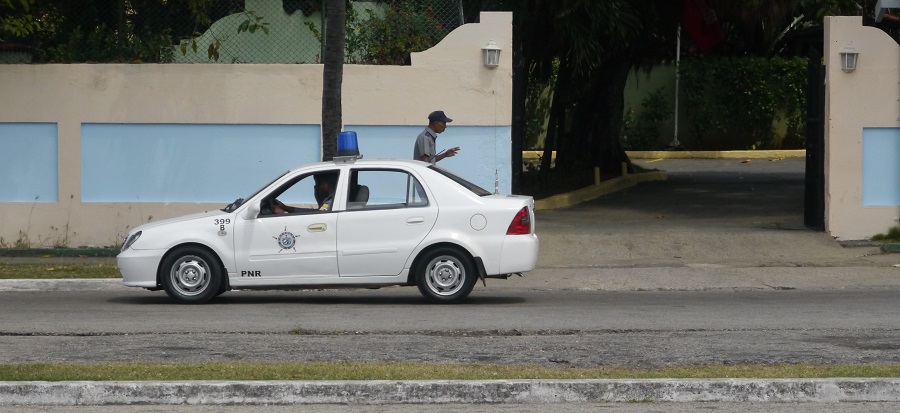As the countdown until the entry into force of the new Cuban Penal Code has begun, after its publication in the Official Gazette of the Republic on September 1, several questions will be inevitable for members of civil society: Are they going to imprison me?
How far is the regime prepared to go to apply a law that obviously breaches fundamental freedoms? Should we prepare for mass incarcerations like those that took place during the Black Spring?
It is important to note that the adoption of this Act nullified Law No. 93, of December 20, 2001 on "Acts Against Terrorism," but not Law 88 on the "Protection of Cuba's National Independence and Economy," aka the Gag Law. The Penal Code and Law 88 will coexist and remain a threat to Cubans who openly disagree with the government.
When the preliminary draft of the Code was published, DIARIO DE CUBA explained, through an analysis of its articles, how the law represents a clear setback for citizens in terms of the exercise of human rights, and further shields those in power.
The Penal Code, as activists and religious leaders have noted, including within the National Assembly, not only maintains the death penalty, but extends it as a punishment for acts carried out against those in power that they classify as crimes, also punishable with life imprisonment or imprisonment for up to 30 years.
In this analysis we will focus on the two articles that most directly target Cuban civil society: 120 and 143, which provide for sentences of between four to ten years in prison.
Article 120. Arbitrary Exercise of Constitutional Rights and/or Freedoms: "Whoever, for any of the purposes expressed in paragraph 1 of the previous article, arbitrarily exercises any right or freedom recognized in the Constitution of the Republic and endangers the constitutional order and the normal functioning of the Cuban State and Government, faces four to ten years in jail."
Article 143. Other offences against State Security: "Anyone who, by himself or on behalf of non-governmental organizations, institutions of an international nature, associations, or any individual or legal person of the country, or of a foreign State, supports, encourages, finances, provides, receives or has in his/her possession, funds, or material or financial resources, for the purpose of financing activities against the Cuban State and its constitutional order, shall face punishments of four to ten years in jail."
Both are purely political in nature: the first attacks people and the sphere of their political rights; the second, the relationships of assistance and financing that each organization needs for the pursuit of their lawful objectives.
Thus far the regime has striven to prosecute and imprison Cuban dissident, activists and independent journalists for common crimes, in order to avoid being taken to task by to international bodies for the number of the country's political prisoners and prisoners of conscience. In fact, the official rhetoric denies the existence of any political prisoners in Cuba. Recourse to crimes outlined in in Articles 120 and 143 to put members of Cuban civil society behind bars will imply tacit recognition that there are political prisoners on the island.
The Penal Code that will soon enter into force had already been criticized in and outside Cuba when it was still a preliminary draft, and the regime knows that the various United Nations rapporteurships will intensify their condemnations of human rights violations in the face of a possible wave of incarcerations for the aforementioned crimes.
We know that the island's rulers tend to ignore and brush off censure by international organizations, and that inconsistencies on the UN Human Rights Council have allowed them to maintain a seat on it, but even the Cuban regime prefers to avoid criticism, especially at a time when the country is going through its worst crisis and the people have begun to lose their patience.
In 2003, imprisoning 75 independent dissidents and journalists sapped support for the regime at the international level, and doing so would now be giving more ammunition to members of the European Parliament demanding the suspension of the Political Dialogue and Cooperation Agreement with the European Union.
In addition, both articles —and they are not the only ones— are in violation of international law, which is another argument against their application.
Does the above mean that the regime will refrain from wielding them against civil society? To say so would be naive. The Criminal Code was not adopted as a decorative element. Long before its entry into force, and even before its publication in the Gazette of the Republic, which marked the beginning of the 90-day countdown until it takes effect as a legal tool, State Security has used it to threaten activists, opponents and independent journalists.
While the main practical use of the entire law is dissuasive, this does not mean that the above-mentioned articles will not be applied, though it will most likely be selective. The target will be, fundamentally, the most threatening figures, whose imprisonment, in addition to neutralizing their leadership, can intimidate others.
The scenario in which the regime would be most likely to unleash its new legal tool on a wide scale is a social uprising like that of 11J, since it has already shown that its only response to the growing popular discontent in Cuba is repression, and not solving the problems that generate discontent.
